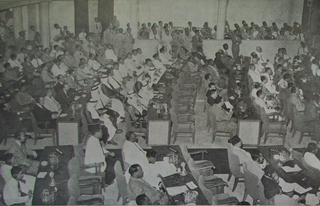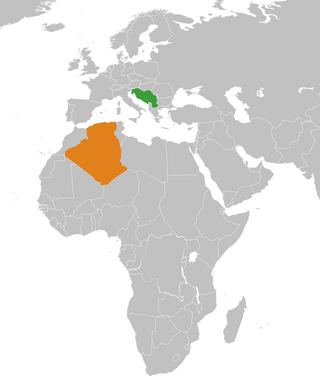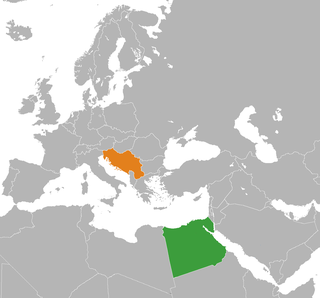
The first large-scale Asian–African or Afro–Asian Conference, also known as the Bandung Conference, was a meeting of Asian and African states, most of which were newly independent, which took place on 18–24 April 1955 in Bandung, West Java, Indonesia. The twenty-nine countries that participated represented a total population of 1.5 billion people, 54% of the world's population. The conference was organized by Indonesia, Burma (Myanmar), India, Ceylon, and Pakistan and was coordinated by Ruslan Abdulgani, secretary general of the Ministry of Foreign Affairs of the Republic of Indonesia.

For India, the concept of non-alignment began as a policy of non-participation in the military affairs of a bipolar world and in the context of colonialism aimed towards optimum involvement through multi-polar participation towards peace and security. It meant a country should be able to preserve a certain amount of freedom of action internationally. There was no set definition of non-alignment, which meant the term was interpreted differently by different politicians and governments, and varied in different contexts. The overall aims and principles found consensus among the movement members. Non-aligned countries, however, rarely attained the freedom of judgement they desired and their actual behaviour towards the movement's objectives, such as social justice and human rights, were unfulfilled in many cases. India's actions often resembled those of aligned countries. The response of the non-aligned nations during India's wars in 1962, 1965 and 1971 revealed non-aligned positions on issues such as secession. The non-aligned nations were unable to fulfil the role of peacekeepers during the Indo-China war of 1962 and the Indo-Pakistan war of 1965 despite meaningful attempts. The non-aligned response to the Bangladesh Liberation War and the following 1971 Indo-Pakistan War showed most of the non-aligned nations prioritised territorial integrity above human rights, which could be explained by the recently attained statehood for the non-aligned. During this period, India's non-aligned stance was questioned and criticized. Jawaharlal Nehru had not wanted the formalization of non-alignment and none of the non-aligned nations had commitments to help each other. The international rise of countries such as China also decreased incentives for the non-aligned countries to stand in solidarity with India.

The Fourteenth G-15 summit was held in Tehran, Iran on May 17–20, 2010. The bi-annual summit agenda of the Group of 15 (G-15) encompassed a range of issues.
The Fifteenth G15 summit was held in Colombo, Sri Lanka in 2012.
The Thirteenth G-15 summit was held in Havana, Cuba on September 14, 2006. The group's meeting was coordinated to take place at the same time as a non-aligned summit of 116 developing nations in the Cuban capital.
The Twelfth G-15 summit was held in Caracas, Venezuela on February 27–28, 2004.
The 9th G-15 summit was held at Montego Bay in Jamaica on 10–12 February 1999.
Ibrahim Omar Dabbashi is a Libyan diplomat who formerly served as the Libyan Permanent Representative to the United Nations in New York. Dabbashi led the country's UN mission in opposing the continued rule of Muammar Gaddafi.

The Socialist Federal Republic of Yugoslavia was one of the founding members of the Non-Aligned Movement. Its capital, Belgrade, was the host of the First Summit of the Non-Aligned Movement in early September 1961. The city also hosted the Ninth Summit in September 1989.

The 18th Summit of the Non-Aligned Movement was held October 25–26, 2019 in Baku, Azerbaijan. The summit was attended by the delegation from more than 120 countries.

Algeria–Yugoslavia relations were historical foreign relations between Algeria and now split-up Socialist Federal Republic of Yugoslavia. Both countries self-identified with the wider Mediterranean region and shared membership in the Non-Aligned Movement. During the Algerian War Yugoslavia provided significant logistical and diplomatic support to the Algerian side which affected its intra-European relations with France. Yugoslavia was the first European country to openly support the FLN.

Egypt–Yugoslavia relations were historical foreign relations between Egypt and now break-up Yugoslavia. Both countries were founding members and prominent participants of the Non-Aligned Movement. While initially marginal, relations between the two Mediterranean countries developed significantly in the aftermath of the Soviet-Yugoslav split of 1948 and the Egyptian revolution of 1952. Belgrade hosted the Non-Aligned movement's first conference for which preparatory meeting took place in Cairo, while Cairo hosted the second conference. While critical of certain aspects of the Camp David Accords Yugoslavia remained major advocate for Egyptian realist approach within the movement, and strongly opposed harsh criticism of Cairo or proposals which questioned country's place within the movement.
Egypt was one of the founding members of the Non-Aligned Movement (NAM). The preparatory meeting for the First NAM Conference in Belgrade was held in Cairo between 5 and 12 June 1961. The first NAM conference was cosponsored between President of Egypt Gamal Abdel Nasser and President of Yugoslavia Josip Broz Tito who sent joint letter to other leaders during their bilateral meeting in Egypt. Cairo hosted the Second Conference in October 1964 attended by forty-seven countries while Egyptian Red Sea resort Sharm el-Sheikh hosted the Fifteenth Conference in 2009. At the time of the Sharm el-Sheikh Conference 118 countries participated in the activities of the movement with some other countries having the observer status. 55 heads of state attended the 2009 conference. Official Egyptian state institutions view the movement as the broadest and the most important framework for developing countries to coordinate their stances on issues on the agenda of the United Nations and to act together against unilateral policies.

Summit Conference of Heads of State or Government of the Non-Aligned Movement on 1–6 September 1961 in Belgrade, Yugoslavia was the first conference of the Non-Aligned Movement. A major contributing factor to the organization of the conference was the process of decolonization of a number of African countries in the 1960s. Some therefore called it the ″Third World's Yalta″ in reference to 1945 Yalta Conference.

Third Conference of the Non-Aligned Movement on 8–10 September 1970 in Lusaka, Zambia was the third conference of the Non-Aligned Movement. A preparatory meeting of Foreign Ministers drafted a number of resolutions which were considered by the Summit Conference. President of Zambia Kenneth Kaunda opened the conference by underlining non-alignment as "the natural choice at the time of increased hostility created by ideological conflicts in the bipolar world"

The Non-Aligned Movement (NAM) is a forum of 120 countries that are not formally aligned with or against any major power bloc. It was founded with the view to advancing interests of developing countries in the context of Cold War confrontation. After the United Nations, it is the largest grouping of states worldwide.
Second Summit Conference of Heads of State or Government of the Non-Aligned Movement on 5–10 October 1964 in Cairo, United Arab Republic (Egypt) was the second conference of the Non-Aligned Movement which followed the Belgrade Conference of 1961 and preceded the Lusaka Conference of 1970. The city of Cairo was selected as a host of the summit conference at the preparatory meeting held in Colombo, Ceylon, on March 23, 1964. At the beginning of the conference the chairmanship of the Movement was transferred from the President of Yugoslavia Josip Broz Tito to the President of Egypt Gamal Abdel Nasser.
50th Anniversary Additional Commemorative Non-Aligned Meeting was the 5–6 September 2011 Non-Aligned Movement foreign ministers commemorative meeting which took place in Belgrade, Serbia. The meeting took place in the House of the National Assembly of the Republic of Serbia, building which hosted the 1st Summit of the Non-Aligned Movement on 5–12 June 1961 during the existence of the Socialist Federal Republic of Yugoslavia. The idea for meeting was proposed by the President of Serbia Boris Tadić during his participation at 15th Summit of the Non-Aligned Movement in Sharm el-Sheikh in Egypt. Some 600 delegates, representing over 100 national delegations, attended the meeting.

The 9th Summit of the Non-Aligned Movement on 4–7 September 1989 in Belgrade, SR Serbia, SFR Yugoslavia was the conference of Heads of State or Government of the Non-Aligned Movement. Belgrade was the first city to host the Summit for the second time after it hosted the 1st Summit of the Non-Aligned Movement in 1961. Yugoslavia was unanimously selected as the host of the Summit at the 1988 Non-Aligned Foreign Ministers Conference in Nicosia, Cyprus. While the Federal Secretary of Foreign Affairs of Yugoslavia led by Budimir Lončar was excited, the Presidency of Yugoslavia, Yugoslav collective head of state, was skeptical about the prospects of hosting the event but ultimately supported it by Josip Vrhovec in fear that rejection may show the level of the crisis in the country. The comparatively weak federal government organizers of the event ultimately hoped that the conference may convince leaders of the strong Yugoslav federal republics to resolve the early Yugoslav crisis in a constructive and peaceful way, yet it nevertheless escalated in 1991 Yugoslav Wars. The event is therefore sometimes described as the swan song of the prominent Yugoslav Cold War diplomacy. Summit took place at the Sava Centar in New Belgrade. Janez Drnovšek held the opening remarks in Slovenian language.
Sri Lanka is one of the founding members of the Non-Aligned Movement. Principles of Non-Alignment and participation in movement's activities is of high priority in foreign policy of the country.











